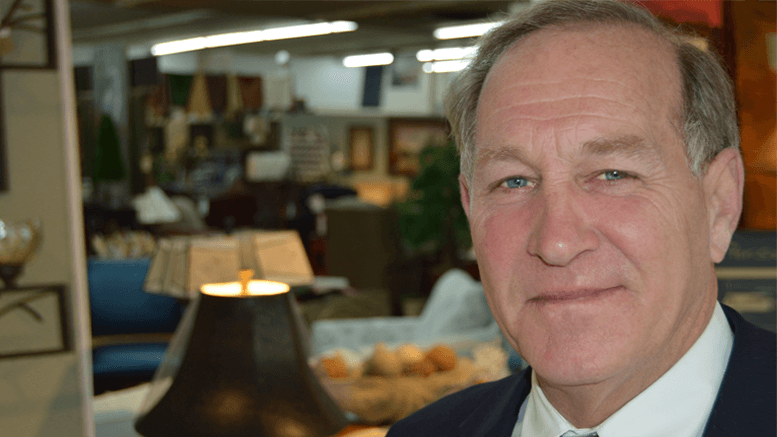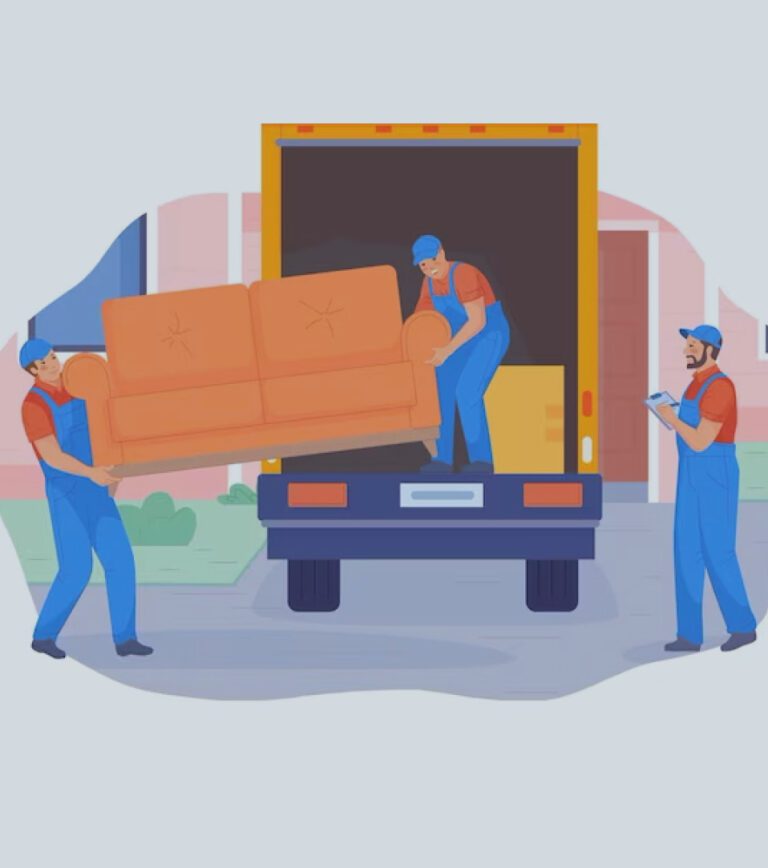Truck driver, salesman, floor sweeper. These days George Perry does a little bit of everything at Sherwood House Furniture. All of them with a smile.
For every home furnishings worker who has fielded a call from a cranky customer demanding to know when the sofa they ordered three months ago will arrive, for every employee who has put that caller on hold and nervously called the manufacturer for an answer, George Perry has a story for you. There was a time—and not too long ago either—when Perry needed inventory for his home furnishings store in Danville, Va., he’d simply hop in the company truck and pick it up himself.
That’s right: The owner of Sherwood House Furniture didn’t wait for the manufacturers’ trucks to pull into his parking lot. He paid them a visit. Just a 90-minute drive down U.S. 29 South and Perry was in Thomasville, N.C. From there it was a short ride to Lexington and over to Hickory and Lenoir. “By the end of the day I was heading home with a truck filled with orders for the store,” says Perry. “My goodness those were the days.”
About George Perry this much is true: He’s a furniture guy—been one ever since Charles Perry, his father, started Sherwood in 1969, buying an old hardware-furniture store and eventually converting it entirely to the latter. George Perry loves looking back on the history of the industry. He can (and does) regale you with stories about the Bassett family’s rise and fall and rise again. He loves nothing more than to share tales about the characters he’s worked with in the three decades he’s been running the family store and a whole lot more.
But Perry is not one of those sentimental store owners forever stuck in the past. He knows that even in Danville, a former textile town that is struggling to catch up with the times, the only way for his store to succeed is to drag it into 2017. “You just can’t sit back and think the good old days will be good forever,” says Perry. “That’s a mistake you don’t want to make. There’s too many other (furniture) places ready to pass you by.”
So Perry and his staff commit themselves seemingly daily to changing with the times. They’ve beefed up the company’s website. Perry doesn’t have the staff to constantly update his store’s inventory online, but he provides links to the manufacturers’ collections he carries. When he noticed a few years back his customers were buying more accessories, Perry delivered. Today his showroom has three times as many accessories as it did a decade ago. And Sherwood still writes up a fair amount of orders from around the state and nation because of his proximity to many American manufacturers.
“We—and I mean all small furniture businesses—have to be nimble and able to change,” Perry says. “We’re never going to have a large part of our business dominated by e-commerce, but I like to think we’re always going to be ready and available to take care of our customers with whatever they need.”
Sherwood has been doing just that ever since Perry’s father, Charles, left his job in 1969 as a manager of Rhodes Furniture in Atlanta to try his hand at running his own store. George Perry says his father showed him how to run the store, but many things he had to learn on his own.
“Customer service is hard to teach,” he says. “You either have that personable way with people or you don’t. We treat everybody like family around here. We’re a small enough operation that it’s not going to be a me-against-you attitude. The way I see it, if you don’t like something I’ve done, let’s solve the problem together. I think people know that about us. That’s why they continue to shop here.”
Perry believes customer service and product knowledge are two important intangibles he leverages, hoping to persuade price-conscious customers to take a second look at lines like Broyhill, Lexington, Taylor King and American Drew.
That hasn’t always been easy in Danville. In the past 20 years the city by the North Carolina border has shed textile, tobacco and furniture jobs by the thousands. Just within the past eight years, Dan River Mills, once one of the city’s largest employers, has lost about 4,500 jobs to India—a devastating contraction for the city and its small businesses like Sherwood House.
The impact of such a large exodus was almost immediate as small business started shuttering across the city. “It was a slow decline and businesses felt it all the way,” Perry recalls. To survive, Perry realized Sherwood would have to serve more than just Danville. “Our trading area got bigger by necessity,” he says. “We had to cast a bigger net just to get the same number of customers into the store.”
Longtime employee Pat Talbot—23 years and counting—says she and other employees worked even harder to persuade thrifty customers. The internet only made selling harder. “Suddenly everyone was coming in having done all their research and homework,” says Talbot. “They know what it looks like, what it does and where it’s made. Some of them know as much as our employees. They could work here.”
Talbot, who started out as the store’s outside collector before adding credit manager and accessories buyer to her work load, said today’s tech-savvy customers have made Sherwood’s five employees “smarter and more focused than ever.”
Part of that focus includes Perry and other employees picking up Sherwood’s merchandise from the manufacturers that still dot southern Virginia and nearby North Carolina. Perry carries American-made lines like Broyhill, Hancock & Moore, Thomasville, Lexington and American Drew—many of which happen to be his neighbors. He’s pleased that brands that took their manufacturing overseas are trickling back to America. “Let’s face it,” he says, “these companies went over to increase profit margin, not quality. Now some of them were the exception and their quality improved, but I like that they’re coming home again.”
Perry doesn’t mind customers walking into Sherwood with printouts from the internet. He welcomes the opportunity to go head-to-head with e-commerce stores. “A lot of people who want to buy online, I’ve come to find out they don’t look kindly on salespeople. But if they find something on Wayfair and want to see it here, that’s great,” Perry says. “It gives us the opportunity to pull up what they found on Wayfair and we can show them what we sell it for. Our overhead is certainly going to be a lot lower than some company in California.”
Perry doesn’t mind the changes to the industry, but he does wish some things were like they used to be. He misses the days a manufacturing rep made his rounds to small towns like Danville and stores like Sherwood House. “These days a salesman coming through our doors?” asks Perry. “He’s got a much better chance of selling us something in our store than from me waiting for market.”
And with competition so thick and margins so thin, Perry and his staff are working even more hours just to stay up with the business. “You used to just pay the utility bill and be done with it, pay the truck expenses and move on. Now we go over everything carefully to see where we could be saving money,” he says. “The independent mom-and-pops are to be commended for what they sacrifice. I could work here 24/7 for the next week and still have things to do—things that need to be done immediately—the very next day. It doesn’t ever seem to stop. There’s always something to do.”
Not that Perry’s complaining. “I still like to think I’ve got the best job in the world,” he says. “The people I work with are wonderful. The newest member of our staff has been here 13 years. We’re like family. And there’s not a day that goes by that’s the same. You can’t beat it.”
What HFA Means to Me
My annual HFA membership is a lot like buying insurance. It gives me pleasure and security knowing whenever I need help with something I’ve got somebody I can fall back on. Sometimes it’s my association that helps me. Sometimes it’s other members. I’m convinced I’m a smarter retailer for being part of something bigger than just me and my store.
George Perry,
Sherwood House, Danville, Va.
Are you an HFA member with an interesting story to tell or is there a member you’d like to read about? Let us know.











